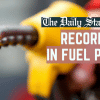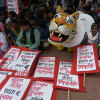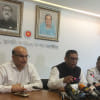Gas price hike to fuel costs for ceramics makers

Production costs in the ceramics industry of Bangladesh will rise by up to 15 per cent due to a recent hike in the price of gas, which adds to the list of crises threatening the sector's overall growth, according to manufacturers.
For large industries, the unit price of gas will increase nearly threefold from Tk 11.98 to Tk 30, as per a notification from the Energy and Mineral Resources Division effective from February 1.
Ceramics makers already spend 7-8 per cent of the total production cost on gas, but it will go up to 12-13 per cent due to the recent price hike, said Md Mamunur Rashid, additional managing director of X Ceramic Group in an interview.
Earlier, production costs increased by around 35 per cent as raw materials became costlier in the face of an ongoing US dollar shortage.
At present, about 40 per cent of the production cost goes into importing the required raw materials, whether it be for tiles, sanitaryware or tableware.
So, the higher price of gas will push up the cost of inputs even further. For example, the cost of producing floor tiles will increase to Tk 12 from Tk 8 per square foot, he added.
Rashid, also vice president of the Bangladesh Ceramic Manufacturers and Exporters Association (BCMEA), then said that ceramic industries have been suffering from a shortage of gas for the past six months.
"We are getting less than 50 per cent of the required gas due to low pressure despite paying more for the fuel. As a result, we are running our factories at only 35-40 per cent capacity," he added.
Rashid went on to say that factory owners are willing to pay more for gas if they are ensured an uninterrupted supply as global prices for the fuel have risen.
He also alleged that ceramics makers are being unable to open letters of credit to import raw materials as they fall under the non-essential products category.
With this backdrop, the executive committee of the BCMEA will soon organise a meeting to decide on price adjustments in line with the higher cost of production.
However, they will have to keep the economy's present condition in mind, so there is no scope to increase prices illogically, Rashid added.
There are more than 70 active ceramic manufacturers in Bangladesh, as per BCMEA data.
Total investment in the industry, both local and international, amount to about $1.70 billion, of which 62 per cent was spent for making tiles, 23 per cent for tableware and 15 per cent for sanitaryware.
The sector has lured foreign investment mainly from China and the Middle East. The joint venture partners include RAK Ceramics, Fu-Wang and China-Bangla with the largest being RAK of the UAE.
BCMEA data shows that the sector is capable of manufacturing 308 million pieces of tableware, 210 million square meters of tiles, and 19 million pieces of sanitaryware each year.
Local companies have been expanding their operations with plans to fully cater to the $905 million ceramics market in Bangladesh.
The total annual consumption of tiles in the country is worth $650 million while it is $75 million for tableware and $180 million for sanitaryware.
Local producers currently cater to about 74.38 per cent of the domestic market with 25.62 per cent being imported.

 For all latest news, follow The Daily Star's Google News channel.
For all latest news, follow The Daily Star's Google News channel. 








Comments